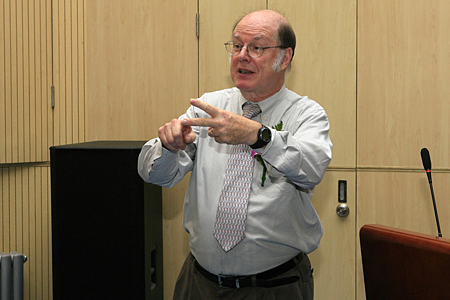Prof. Charles H. Bennett, Member of the National Academy of Sciences of USA, gave a lecture named “Information is Quantum--how physics has helped us understand what information is and what can be done with it” at AMSS on Aug.31, 2012. CAS (Chinese Academy of Sciences) Academician Prof.LU Ruqian, AMSS presided over the meeting.
In his talk, he pointed out that the information revolution is largely based on what a physicist would call a classical view of information, assuming that it can be copied freely and is not disturbed by observation.

Quantum effects in information processing, which prevent the information in microscopic objects like atoms or photons from being observed or copied accurately, were long regarded as a mere nuisance, but are now known to make possible feats such as quantum cryptography, quantum teleportation and dramatic computational speedups. Although progress toward a practical quantum computer is slow, other surprising quantum informational effects continue to be discovered, and quantum cryptographic systems are already available commercially. Most importantly, the quantum approach has led to a more coherent and powerful way of thinking about how physical objects interact and influence one another, and how that interaction can be used to compute, communicate, and protect privacy. This talk will avoid mathematical complications and instead aim to explain central quantum concepts like entanglement, which at first sight seem counterintuitive.
Prof. Charles H. Bennett He is an IBM Fellow, a Fellow of the American Physical Society, and a member of the National Academy of Sciences. In 1984, Prof. Charles H. Bennett and Prof. G. Brassard proposed and developed a practical system of quantum cryptography, which was called BB84 protocol in quantum information science. It allowed secure communication between parties who shared no secret information initially, based on the uncertainty principle instead of usual computational assumptions such as the difficulty of factoring.In 1992, Prof. Bennett and Prof. Brassard, discovered “quantum teleportation”, an effect in which the complete information in an unknown quantum state is decomposed into purely classical information and purely non-classical Einstein-Podolsky-Rosen (EPR) correlations, sent through two separate channels, and later reassembled in a new location to produce an exact replica of the original quantum state that was destroyed in the sending process, which was called B92 protocol in quantum information science, which had pushed the quantum information technology into higher level.
Prof. Charles H. Bennett has published several academic papers on famous international journals and joined many international conferences as the invited speaker. He has made great contribution to the development and prosperity of quantum information science.